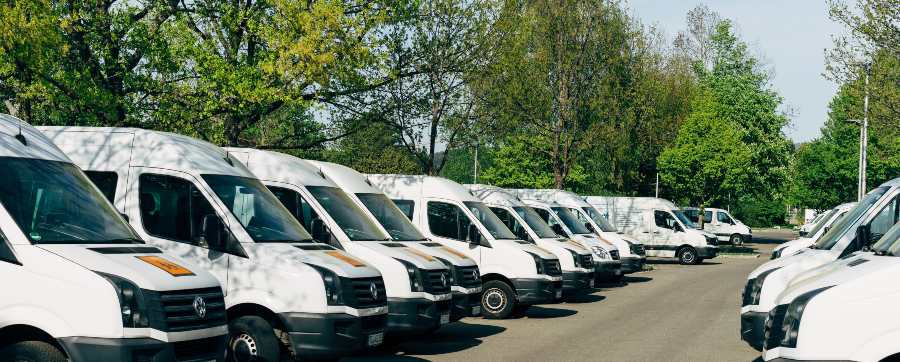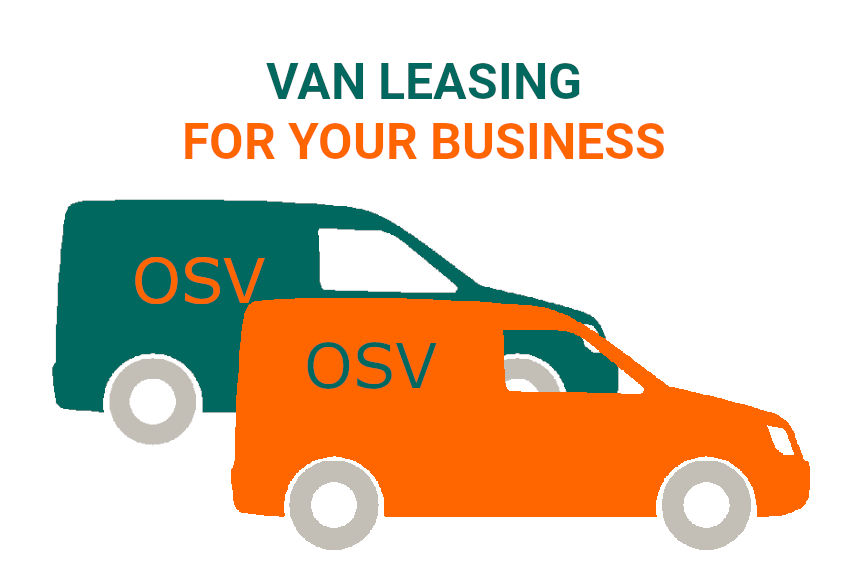It’s probable that if you have a business and are looking for a vehicle, then you’re thinking about getting a van. Of course, it may be that you want several vans. So, how are you going to go about getting them?
There are a few options available to you when looking for any vehicles for your business, depending on your requirements. You can buy the van outright with cash, use a purchase scheme or get a lease.
We know that when it comes to business, cash is king and if you’re buying several new vans then cash may not be the most attractive or viable option available. Using a purchase scheme such as Hire Purchase gives you a little more control over your monthly budget and you will still own the vehicles at the end of the agreement. It is worth knowing that your monthly payments may be high.
The final option to consider is leasing, this is a method that is becoming increasingly popular and many more people are now choosing.
But how does business leasing work? What are the benefits?
At OSV, we talk about leasing on a regular basis with both businesses and private individuals.In this article, we look at everything you need to know about van leasing for businesses, including the options available and how Company Van Tax actually works.
Looking for a van, but not sure what you’re after? Sign-up for our weekly special offer newsletter to get our best deals right to your inbox.
What options do I have for van leasing?
If you want to get a van through your business there are two leasing options available, Contract Hire and Finance Lease.

What is Contract Hire?
Contract Hire is the most common form of business leasing, and it’s a great option if you’re looking to lease a van.
If you get a van on a Contract Hire agreement you essentially have the vehicle for a fixed period of time, during which you make monthly payments of the amount set at the start of your contract. You will also have a pre-agreed mileage and agree to keep the van in good condition, in line with the BVRLA Fair Wear and Tear Guide. It is worth knowing that the standard set by the BVRLA for vans gives you a little more leeway in terms of what is and isn’t allowed.
When the contract is up, you hand the car back with nothing more to pay (subject to mileage and condition restrictions).
What are the benefits of Contract Hire?
Contract Hire is very appealing to businesses, and it’s easy to see why.
The price of your van is fixed for the duration of the contract, and there is no need to think about depreciation. The financial commitments of a Contract Hire agreement can also be “off balance sheet” which means that the liability of the finance doesn’t appear on the company accounts.
If your company is VAT registered then you can also claim up to 100% of the VAT back on your monthly van rentals. It should be noted that this is only possible if the vehicle isn’t also used for personal journeys (we will talk more about this later in the article). If you do use your vehicle for personal errands it is still possible for you to claim the monthly cost of the lease against profits.
If your van emits more than 110g/km of CO2, then it’s possible to claim 85% of the VAT back on your monthly payments.
If it emits any less, then you can claim 100% back. We have put together a list of some of the best electric vans available in the UK for your reference.
What is Finance Lease?
A Finance Lease is a more traditional, and in some ways a more flexible, way to lease a van. With a Finance Lease, there are no mileage or condition restrictions and you are also able to convert the vans in order to meet your business requirements, e.g. installing refrigeration units.
With a Finance Lease, you pay a fixed monthly fee for a set period of time. Once that time is up you have two options:
- Pay a Peppercorn Rental, which is usually the cost of one monthly payment. This allows you to keep your van for another year.
- Get a third party to purchase the van from you in order that you can pay off the remaining balance you owe (also referred to as the balloon payment). If you sell the ban for less than you owe for the balloon payment then you are responsible for finding the additional sum. However, if you are able to sell the van for more than the balloon payment you can use the equity in whatever way you want – perhaps the deposit on your next van.
If, after you’ve sold the van on, you buy the van back from the person who purchased it, then that’s up to you.
What are the benefits of Finance Lease?
Businesses often choose Finance Lease because there are no mileage or condition restrictions. Therefore, they do not have to worry about additional charges at the end of the contract.
The liability of the finance can also be “on balance sheet” which can be good for the company accounts. Finance Lease is also good for budgeting, as you know how much the balloon payment is going to be right at the start of the contract, and therefore have plenty of time to budget for the larger payment.
If you decide you don’t want to part with your van when the contract ends, you can make a Peppercorn rental payment each year (until the Finance House will no longer allow it).
You definitely need to be aware that you will still need to make the balloon payment at the end of your contract and this amount won’t change.
Want to find out more about the leasing options available? Download our FREE guide to leasing
How do I qualify for van leasing?
As long as you are a business, you will be eligible to lease a van through your business. This includes if you are a sole trader. However, it takes more than simply being a business to actually qualify for van leasing.
You will have to apply for, and meet the requirements for finance as the Finance House needs to be positive that you will be able to make the monthly payments. The key way that the Finance House will do this is by carrying out a credit check. It is possible that you will also be asked to provide more information to the Finance House.
Ideally, you should be prepared to present the following to the Finance House:
- Proof of UK residency
- 3 years of address history
- No current CCJ’s
- Proof of positive trading (for at least three months)
- A Director that can act as a guarantor
- A full UK driving licence
- Opening balance sheet if available
If that all checks out, then you are good to go ahead with your business lease contract.
Can I get a van lease if my business has bad credit?
If your business has bad credit, then it can make things more difficult. However, it’s not impossible. If the finance house can see that you have positive trading for the past few months, then that should go some way to prove to the finance house that you can make the monthly payments.
If your business has bad credit then the Finance House will look to the company director(s). If they have a strong credit score, then the Finance House may ask for a Director’s Guarantee. A Director’s Guarantee is what happens when the company director (or directors) act as a guarantor and agree to take on the responsibility of the monthly payments if the business is unable to.
If the business and the company director(s) have bad credit then it will become more difficult to get a business lease. However, as we have mentioned previously, it’s important that you speak with a vehicle broker experienced in working with businesses as it’s likely they will be aware of alternative options available and go over them with you in detail.
Can I get a van lease if I have a new company?
If your company is new then it will be, admittedly, slightly more difficult to get a van lease, but it’s not impossible. This is primarily due to the fact that your business won’t have a long history of positive net worth as it’s new. This means that the Finance House can’t be sure you’ll be able to make the monthly payments as there is no proof that you have done this in the past.
This can’t be helped, however, if your company is newer and therefore doesn’t have such a long credit history to look at, we would recommend you talk to someone at OSV as we’ll be able to talk you through the options that are available to you.
How does Company Car Tax work for vans?
If you have a company vehicle, then the chances are you will have to pay company car tax. However, company car tax works differently for vans than it does for cars.
You will not have to pay company car tax for your van if you use your van for business journeys only. This includes journeys that are:
- A legitimate part of the daily work
- Journeys to a temporary workplace (such as if you’re working on a job site)
You can also use your van for ‘insignificant’ private journeys. This includes things such as grabbing a coffee or picking up a newspaper.
However, if you use your van for personal journeys such as doing the weekly shop or picking your kids up from school, then you will have to pay Company Car Tax.
If the vehicle is a ‘pool van’ then you will be exempt from paying Company Car Tax. In order to qualify as a pool van it needs to meet the following requirements:
- The van is available for use (and is used by) more than one employee
- It’s available to each employee for them to do their job
- The van isn’t ordinarily used by just one employee, to the exclusion of others
- Isn’t normally kept at or near an employee’s home
- Is only used for business journeys
- Exceptions include driving the van home to get an earlier start the next day
If you would like to find out more about Company Van Tax, we have put together a comprehensive guide that outlines what you need to pay and under what circumstances your vehicle is exempt.
When it comes to leasing a van for your business there are two options; Contract Hire and Finance Lease. Each of these lease types has advantages and disadvantages and are suited to different people. When applying for a business lease there are a few requirements you’ll need to meet and some items you will need to present to the Finance House in order to ensure that you qualify. As long as you have a strong credit score then the process will be straightforward. However, this does not mean that you will be unable to get a lease, it will just be a little more complicated, don’t be disheartened if the process contains a few more steps.
Ultimately, as long as you work with an experienced broker, like OSV, you’ll get the help you need to work through every step of the process.
We hope that this has answered some of the questions you may have about leasing a van for your business.
